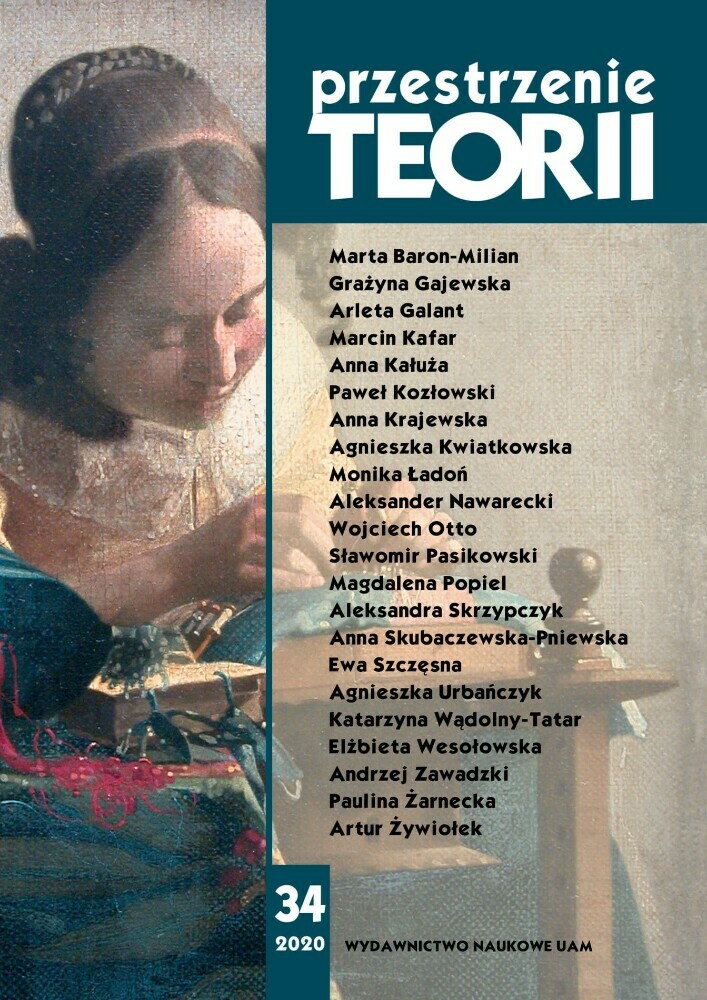Abstrakt
The author analyses the theoretical and empirical convergence between posthumanist studies and disability studies. She begins with an explanation of the philosophy and tasks that researchers on posthuman disability set themselves. She discusses this issue using the example of the movie Orchids. My Intersex Adventure by the Australian director Phoebe Hart and her autobiographical texts. In the last part of the article, the author focuses on the concept of hybrid theories based on intersectionality.
Bibliografia
Braidotti R., Po człowieku, tłum. J. Bednarek, A. Kowalczyk, Warszawa 2014, s. 82.
Cixous H., Śmiech Meduzy, tłum. A. Nasiłowska, „Teksty Drugie: Teoria Literatury, Krytyka, Interpretacja” 1993, 4/5/6.
Deleuze J., Guattari F., Kłącze, tłum. B. Banasik, „Colloquia Communia” 1988, nr 1–3.
Disability in Science Fiction. Representations of Technology as Cure, ed. by K. Allan, New York 2013.
Endersby J., Orchid: a Cultural History, Chicago and London 2016.
Ferrando F., Posthumanism, Transhumanism, Antihumanism, Metahumanism, and New Materialism: Differences and Relations, „Existenz: An International Journal in Philosophy, Religion, Politics, and the Arts” 2013, nr 8 (2).
Gajewska G., Arcy-nie-ludzkie. Przez science fiction do antropologii cyborgów, Poznań 2010.
Gajewska G., Orchidea – studium o posthumanistycznej (inter)płciowości i seksualności, „Autobiografia. Literatura, Kultura, Media” 2019, nr 2 (13).
Haraway D., Manifest cyborgów: nauka, technika i feminizm socjalistyczny lat osiemdziesiątych, tłum. S. Królak i E. Majewska, „Przegląd Filozoficzno-Literacki” 2003, nr 1.
Haraway D., Staying with the Trouble. Making Kin in the Chthulucene, Durham and London 2016.
Hart P., Orchid Love, [w:] New Philosophies of Sex and Love. Thinking Though Desire, red. S. LaChance Adams i in., London–New York 2017.
Hart P., Orchids: Intersex and Identity in Documentary, <https://www.academia.edu/21221085/Orchids_intersex_and_identity_in_documentary> [dostęp: 30.07.2019].
Hart P., Orchids: My Intersex Adventure. Annex to the film, doctoral dissertation in: School of Film and Television, Creative Industries Queensland University of Technology, <https://www.academia.edu/21221085/Orchids_intersex_and_identity_in_documentary> [dostęp: 30.07.2019].
MacFarlane L., blog, <http://larissamacfarlane.blogspot.com/2017/07/marking-anniversary-with-vitruvius.html> [dostęp: 30.07.2019].
Monstrosity, Disability, and the Posthuman in the Medieval and Early Modern World, ed. by R.H. Godden, A. Simon Mittman, New York 2019.
Nayar P.K., Posthumanism, wyd. 2, Cambridge 2016.
Posthuman Glossary, red. R. Braidotti i M. Hlavajova, London–New York 2018.
Siordia C., Disability Prevalence According to a Class, Race, and Sex (CSR) Hypothesis, „Journal of Racial and Ethnic Health Disparities” 2015, 2.
Ziemińska R., Niebinarne i wielowarstwowe pojęcie płci, Warszawa 2018.
FILMOGRAFIA
Orchids: My Intersex Adventure, reż. P. Hart, Australia 2010, <https://www.youtube.com/watch?v=h8v-WSuhFjk> [dostęp: 5.08.2019].
Licencja
Autorzy
Autorzy tekstów przyjętych do publikacji w czasopiśmie „Przestrzeniach Teorii” są zobowiązani do wypełnienia, podpisania i odesłania na adres redakcji umowy o udzielenie nieodpłatnej licencji do utworów, z zobowiązaniem do udzielania sublicencji CC.
Zgodnie z umową, autorzy tekstów opublikowanych w czasopiśmie „Przestrzeniach Teorii” udzielają Uniwersytetowi im. Adama Mickiewicza w Poznaniu niewyłącznej i nieodpłatnej licencji oraz zezwalą na użycie sublicencji Creative Commons Attribution-NonCommercial-NoDerivatives 4.0 International (CC BY-NC-ND 4.0).
Autorzy zachowują prawa do dalszego, swobodnego rozporządzania utworem.
Autorzy, którzy wykorzystują w swoim tekście cudze utwory (np. ilustracje, fotografie) proszeni są o dostarczenie do redakcji czasopisma zgodę na publikację od uprawnionych podmiotów.
Użytkownicy
Zainteresowani użytkownicy internetu uprawnieni są do korzystania z utworów opublikowanych po 2015 roku „Przestrzeniach Teorii” tylko w calach niekomercyjnych, pod następującymi warunkami:
- uznanie autorstwa - obowiązek podania wraz z rozpowszechnionym utworem, informacji, o autorstwie, tytule, źródle (odnośniki do oryginalnego utworu, DOI) oraz samej licencji;
- bez tworzenia utworów zależnych - utwór musi być zachowany w oryginalnej postaci, nie można bez zgody twórcy rozpowszechniać np. tłumaczeń, opracowań.
Do wszystkich tekstów opublikowanych przed 2015 r. prawa autorskie są zastrzeżone.
Inne
Uniwersytet im. Adama Mickiewicza w Poznaniu zachowuje prawo do czasopisma jako całości (układ, forma graficzna, tytuł, projekt okładki, logo itp.).

